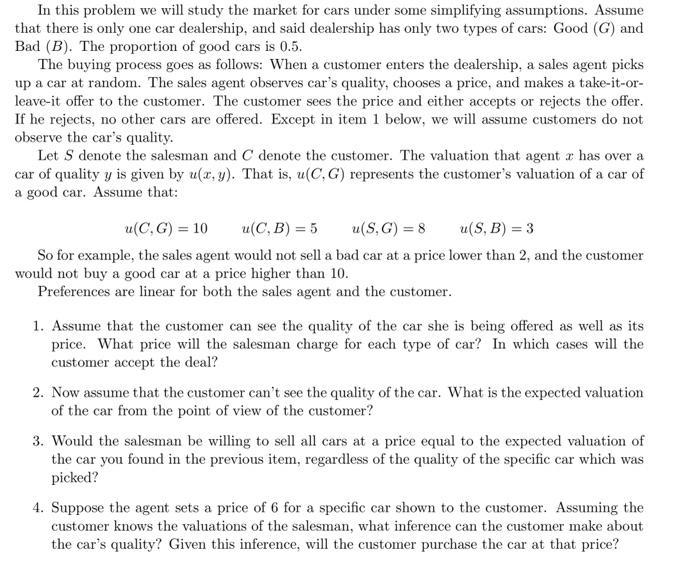Answered step by step
Verified Expert Solution
Question
1 Approved Answer
In this problem we will study the market for cars under some simplifying assumptions. Assume that there is only one car dealership, and said


In this problem we will study the market for cars under some simplifying assumptions. Assume that there is only one car dealership, and said dealership has only two types of cars: Good (G) and Bad (B). The proportion of good cars is 0.5. The buying process goes as follows: When a customer enters the dealership, a sales agent picks up a car at random. The sales agent observes car's quality, chooses a price, and makes a take-it-or- leave-it offer to the customer. The customer sees the price and either accepts or rejects the offer. If he rejects, no other cars are offered. Except in item 1 below, we will assume customers do not observe the car's quality. Let S denote the salesman and C denote the customer. The valuation that agent a has over a car of quality y is given by u(x, y). That is, u(C, G) represents the customer's valuation of a car of a good car. Assume that: u(C, G) = 10 u(C, B) = 5 u(S, G) = 8 u(S, B) = 3 So for example, the sales agent would not sell a bad car at a price lower than 2, and the customer would not buy a good car at a price higher than 10. Preferences are linear for both the sales agent and the customer. 1. Assume that the customer can see the quality of the car she is being offered as well as its price. What price will the salesman charge for each type of car? In which cases will the customer accept the deal? 2. Now assume that the customer can't see the quality of the car. What is the expected valuation of the car from the point of view of the customer? 3. Would the salesman be willing to sell all cars at a price equal to the expected valuation of the car you found in the previous item, regardless of the quality of the specific car which was picked? 4. Suppose the agent sets a price of 6 for a specific car shown to the customer. Assuming the customer knows the valuations of the salesman, what inference can the customer make about the car's quality? Given this inference, will the customer purchase the car at that price? 5. Super challenge question! Now suppose that this game between the sales agent and the customer is repeated infinitely many times. Suppose that, after a car is purchased, the customer observes the quality. Consider the following strategy profile. The sales agent sets price 10 if the car is good and 5 if the car is bad. The customer starts purchasing all cars with price up to 10 and keeps doing so until a bad car is sold at price higher than 5. From that point forward, the customer only purchases cars up to a price of 5, and keeps using this rule forever. Can this strategy profile be a subgame perfect Nash equilibrium? If so, what is the minimum discount factor & required?
Step by Step Solution
★★★★★
3.40 Rating (147 Votes )
There are 3 Steps involved in it
Step: 1
1 The salesman will charge a price of 8 for a good car and 3 for a bad car This is because the sales...
Get Instant Access to Expert-Tailored Solutions
See step-by-step solutions with expert insights and AI powered tools for academic success
Step: 2

Step: 3

Ace Your Homework with AI
Get the answers you need in no time with our AI-driven, step-by-step assistance
Get Started


